- Home
- Steven Becker
Wood's Fury Page 2
Wood's Fury Read online
Page 2
Though the boat could run thirty knots if pressed, the most fuel efficient and comfortable ride came at about sixteen knots, so it was a half hour later when he saw the masts of the sailboats at the Marathon Yacht Club come into view. He always thought it ironic that the snobby club was located next to the public boat ramp. Aiming for the center of the green and red markers, he entered the small turning basin and spun the wheel, allowing the boat to coast up to the concrete dock. As visible as the channel markers were from sea, Trufante’s smile from the dock was like a beacon. Mac wasn’t surprised to find him ready and waiting.
There was no need for small talk between the men. This early in the morning, without alcohol in his system, Trufante was generally quiet. “Where’s the bait?” Mac asked.
Trufante drank from his styrofoam cup, jerking upright when the hot coffee burned his tongue. “Shoot. Did well at the bridge piers the day before yesterday. Tide should be moving—they’ll be there.”
After Tru boarded, Mac ran west, parallel to shore. They were coming up on the bridge, but there was a shoal dead ahead. The Knight’s Key Bank was marked, but the mast from a sailboat sitting at a forty-five-degree angle to the water was a reminder of its danger. “What side?” he asked Trufante.
“Best spot is by the old bridge, if you want to spend the gas and time.”
He steered toward Fred the Tree, an Australian Pine growing from the roadbed of the old Seven Mile Bridge. A symbol of the Conch’s tenacity, the tree stood bare after just having its Christmas decorations removed. After passing the shoal off Pigeon Key, he cut back toward the bridge, and followed it for another few miles, until he could see the decrepit arched piers of the old railroad bridge ahead. As he steered toward them, he thought about what Trufante had said. For many species, using live bait was the difference between a fisherman getting skunked or bringing home a limit. Many a fisherman, not wanting to “waste” the gas or time catching bait, ran out to the reef or offshore unprepared, and came back disappointed. Trufante set his cup in the holder and stood up. With his hand to his brow to cut the glare from the rising sun, he scanned the surface of the water. “Ripples over there,” he said, pointing to a spot of disturbed water.
Mac squinted, not sure if he was looking at the right place. Instead of searching the water, he steered in the direction of Trufante’s extended finger. Once they were close enough that he could see, he dropped to an idle, while Trufante got the cast net ready. Using the limits of his six-foot-five wingspan, he loaded the net, and once Mac was within range, wound up and threw it. The ten-foot net opened in a perfect pancake and disappeared below the water. Mac counted to ten in his head and right on time Trufante pulled the brail lines back to the boat. While he hauled it aboard, Mac swung the bow into the wind, so they wouldn’t drift back into the bridge, and helped Trufante load the bait well.
They were both smiling a few minutes later as they entered Moser Channel and crossed under the main span of the bridge. With over an hour to kill before they reached the Hump, and the only hazard clearly marked by the iconic red tower looming over Sombrero Reef, well to the east of their course, Mac set the trawler’s auto-pilot and sat down to drink his coffee. Across from him, Trufante was fast asleep.
“Fish on!” Trufante jumped up from the chair and grabbed the rod from its holder.
Mac was always amazed by his deckhand’s reflexes as Trufante went from zero to sixty faster than a marlin chasing a skipjack. Holding the rod tip high, Trufante set his hand lightly on the reel and let the fish take line as Mac continued to troll the baits through the spread. Unlike many charter captains and recreational fishermen who tried to get as many lines in the water as possible, Mac ran three. Like many commercial fishermen, he preferred to have the additional maneuverability he gained without having to worry about lines crossing.
The sound a reel makes when a fish strikes signals a primal surge of adrenaline and when the starboard side rod went off, Mac dropped the engine to idle and grabbed the rod. Holding it high, he glanced ahead to get an estimate of where the birds that had led them to the school of fish were headed and adjusted the autopilot setting to intercept them.
Together the men started to work the fish to the boat. After their initial run, both fish sounded, swimming deep into the indigo water, telling Mac they were tuna. He and Trufante pumped the rods up and down, pulling the fish closer on the upstroke, and reeling the slack line on the downstroke. A few minutes later, Mac saw a flash of silver off the transom. Trufante’s fish was ready to come in. Setting his rod in the holder, he checked the drag, and grabbed the gaff from the holder built into the gunwale. They had done this dance many times, with much larger fish, and each man knew what to do. The swivel hit the tip of Trufante’s rod, and still holding the rod high, he started to step backwards, bringing the fish closer to Mac, who was leaning over the gunwale ready to grasp the leader.
Mac took a wrap around his hand, then and pulled the fish alongside the hull to within range of the gaff. He had to be careful, as fish often made a last and violent run when they saw the boat. If that were the case, he would have to release the line before he lost a finger, or, if the fish was big enough, pulled him overboard. The gaff was in the water and he was about to lift up and impale the fish on the sharp point when the third rod went off. It distracted him just enough to affect his aim, and the point of the gaff slid across the fish’s side, causing it to panic and run.
Mac cursed himself, but knew it was still hooked. Trufante went back to work on the fish while Mac grabbed the third rod. In the distance, he saw a splash and grinned, knowing it was a mahi-mahi, known locally as dolphin. It was far enough out that he wasn’t worried about it entangling their other lines, allowing him to set the rod in the holder and bring the tuna in first. Trufante had his fish, now exhausted from its last run, by the boat, and Mac easily gaffed and lifted it aboard. It always felt good to get that first fish in the box, but there was no time to celebrate, as there were two others still out there. With each man taking a rod, both fish were soon aboard.
“Damned good start,” Trufante said, revealing his Cadillac grin.
Mac knew he’d want a beer and nodded toward the cabin. Even though it was only nine o’clock, it was their tradition. Once a fish was in the box, Trufante could start drinking.
A minute later, he emerged with his morning beer. “We oughta make another pass,” he said, cracking the seal.
Mac went back to the helm and plotted a reciprocal course while Trufante readied the rods. The Marathon Hump was a known fish attractor. Sitting in a thousand feet of water at its base, the seamount rises to within four-hundred-eighty feet of the surface. With the Gulf Stream’s six-knot current pushing against it, baitfish are drawn up to the surface. The gamefish are not far behind.
Around noon, the bite died with the tide, but with both fish boxes full, it was a successful trip. Prices were up, and Mac could see Trufante calculating his take, as he turned back to the north and Marathon. Heading out in the morning might have been nap time, but the return trip, especially after a successful day, was beer-drinking time. Mac had a cold one in his cup holder. It was his first and he would only allow himself one more. Trufante, on the other hand, was probably into his second six-pack.
Even with many more beers in him, Trufante could see what was invisible to Mac, which bothered him. Mac knew glasses were in his future, but kept putting it off—although he did think of getting prescription sunglasses, because fishing was important.
Trufante set his beer down. “Yo, Mac. Check that out.”
Mac squinted through the windshield, blaming the salt-spotted glass for his inability to see what Trufante did.
“Dude, suck it up and get some glasses.” Trufante pointed to what would be two o’clock.
Mac finally saw it. “Just a bunch of trash.”
“Shoot. There’s a turtle in the mix.”
“Since when are you into saving the planet?” Fishermen were stereotyped as fish slayers, not caring a
bout the environment. For some that was true, but the vast majority knew if they didn’t foster the oceans, there would be no fish left to catch. Mac headed toward the object.
“Get the gaff. It’s stuck with all that crap around it,” Mac said, dropping to an idle and letting the current take the boat toward the turtle.
“Big sucker,” Trufante said, as he leaned over the gunwale and gaffed what looked like a package. “Square goddamned grouper.”
Three
“Free the turtle and put that crap back.” Mac pulled the boat alongside the floating debris. Being caught with drugs or contraband was the fastest way to lose your boat, even if the circumstances were innocent. Trufante knew that, too, but it wouldn’t stop him; he had half a digit missing on his right hand from his last dance with a square grouper. Mac knew the risks, but couldn’t leave the turtle.
Mac could see the reluctance in Trufante’s face as he reached out with the gaff and pulled the mass of packages and seaweed closer. “You gotta see this. Ain’t no accident.”
Mac dropped the engine into neutral, glanced at the radar to make sure they were alone, and crossed the deck to where Trufante stood. He looked down at the turtle, feeling empathy for its plight. Lashed to its shell were a half-dozen rectangular packages along with two antennas mounted on styrofoam buoys. Along the way, the irregular surface had allowed seaweed to latch onto it, making it almost impossible for the turtle to swim.
“What’re we gonna do?” Trufante asked, still holding the gaff.
The turtle looked up at them, and Mac could tell from its glassy eyes that it was probably near exhaustion. Mac, like many other fishermen, believed that turtles had souls and spotting one brought luck. “Tie it off and start cutting those damned packages loose.”
“What if they got cash?” Trufante asked.
“Really? You’re wanting to go there?” Mac asked and turned away to find a line to tie the flotsam to the boat while they cut the turtle free. He knew Trufante wouldn’t give up easily, but he was determined to help the turtle and get rid of the packages. “Here.” He handed Trufante one of their dock lines and reached over the gunwale with a bait knife.
Just as he made the first cut, he heard the sound of a small plane coming toward them. He looked up at the sky, trying to locate it, and saw a dot on the horizon. It could be nothing, he thought, but still ten miles past the reef, he doubted it. Looking at the antennas, he saw each had a small waterproof unit, about the size of a handheld VHF radio, attached. Both had a blinking light.
Fortunately, the plane seemed oblivious to them and continued on its northward track.
The plane and transmitters added to the urgency of the situation. Any second, someone could come looking for the packages, and they would surely be armed. With only a shotgun and bang stick aboard, Mac knew he would not be able to defend himself. Glancing back at the sky, he saw nothing. The plane was gone, but it served as a warning about how quickly this could turn ugly.
Trufante tied the line to one of the packages, but the plane had Mac spooked. “See what’s on the radar.”
“We gonna have a look?” Trufante grinned, crossed the deck, and entered the wheelhouse. “Ain’t nothing between us and the reef.”
The easiest course would have been for Mac to leave the site and make an anonymous call to report it, but just as he was about to release the line, the turtle blew threw its nose. Mac looked down at the exhausted animal. Its tired eyes locked onto his, and knew he couldn’t leave it. He rose, and went to the wheelhouse. “Cut the packages loose. I’m going to figure out what to do about the turtle.” He handed Trufante the bait knife and looked at the electronics.
“Pamela’s been volunteering at that Turtle Hospital,” Trufante said.
Mac was both surprised and happy that she was doing something besides occupying a bar stool. The Turtle Hospital in Marathon was the logical call. If the turtle needed attention, they would handle it. Switching the VHF radio on, he checked that it was on channel 16, and switched to high power. Just before he hailed them, he thought about how many people, including the Coast Guard, Fish and Wildlife, and the sheriff would hear the radio call. And with the drugs involved there might be others listening. Mac wanted to do the right thing, but not spend the rest of the day filling out paperwork. With his cell phone useless this far out, he glanced back at Trufante, and walked into the cabin. Grabbing a small case from a locker above the chart table, he went back to the helm and unlatched the clasp. The satellite phone was new, and unused; a “gift” from Mel.
After a few minutes, Mac figured out how to operate it. Wondering if 411 was still active, he was about to enter the number when he thought of Pamela. “What’s Pamela’s number?”
Trufante looked up, surprised, and recited her digits. As he entered her Palm Beach area code, it only confirmed Mel’s theory that she lived off a closely regulated trust fund. Mac punched the rest of the numbers into the keypad as he recited them and hit send.
Surprised that 411 worked, he waited while it rang, wondering how he was going to ask her. Pamela was an enigma and frankly she scared him a little. When she answered, instead of asking her himself, he handed the phone to Trufante. “Get the hospital’s number for me.”
The questions took several minutes, as she tried to diagnose the turtle’s injuries over the phone. Mac knew her preferred means of healing was through divination, and with his patience dwindling, he took the phone from Trufante and asked for the number before she could continue. After thanking her, he entered the number for the Turtle Hospital and allowed the satellite service to connect the call. While he waited, he tried to remember the name of the tech there who had helped him before. It came to him just as the call was answered.
“Hey, is Jen around?” Mac was relieved when he was asked to hold while the woman who answered the call could locate her. A minute later, a familiar voice came over the line.
“Hi, this is Jen.”
“Hey, this is Mac Travis,” he paused.
“Oh, right. I remember you,” she said.
Mac tried to read her voice, not sure if being remembered was a good or bad thing. He let it go. “I’ve got a turtle that’s not looking so good. We’re about five miles off the reef.”
“Give me a minute,” she said.
While Mac waited, he looked back at Trufante. The Cajun was leaning over the gunwale, working to free the packages. Mac wondered what was taking him so long, but before he could ask, Jen came back on the line.
“I’ve got a boat ready to go. What’s your vessel’s name and location?”
Mac gave her the name, and read the coordinates from the GPS screen to her. She confirmed and asked him to anchor and watch the turtle until they arrived. He explained that they sat in over five-hundred feet of water, and anchoring was out of the question. They would have to drift with the turtle. He disconnected the call and walked back to the transom.
“Got the Turtle Hospital coming out,” Mac said.
“Hand me that bucket by the bait well.”
Mac didn’t think anything of it, assuming Trufante was going to use it for the cut pieces of rope. He grabbed the handle, handed it to Trufante, and leaned over to check on the turtle. It looked at him again, and Mac turned away, not wanting to see the pain in its eyes. Glancing toward the reef, he hoped the Turtle Hospital boat would arrive soon.
Trufante stood. “Cut’em loose. Turtle’s just floating with us.”
Mac looked out over the transom. With a line loosely wrapped around the turtle’s webbed foot tied to a cleat, the turtle idly drifted with the boat. Looking behind, Mac saw the packages floating away and couldn’t help but notice the antennas and buoys were gone. A wake spread out behind the packages, something that wouldn’t be there if they were floating normally, but before Mac could figure out why, he heard someone hail Ghost Runner on the VHF.
Mac left the turtle and went back to the helm. The rescue boat was asking for an updated location. Mac read the coordinates from the screen a
nd grabbed a pair of binoculars from the small compartment below the wheel. Scanning the reef line, he saw a boat coming toward them. He had expected one of the Hospital boats and started to grow concerned when he saw it was the Fish and Wildlife Commission.
There was nothing to do now, except suffer through it, and he hailed the FWC boat, confirming that they were headed to the correct boat. It was no surprise that Trufante, after seeing the light bar above the T-top, had gone below. Mac sat on the transom watching the turtle, waiting as the FWC boat approached and slowed. Mac rose and signaled the captain to come along the starboard side, away from the turtle. Along with the FWC officer were Jen and Pamela.
“You do have a heart, Mac Travis,” Pamela said.
Mac ignored her and helped the FWC man with the lines. With the boats rafted together, the officer looked at Mac for permission to board. Mac nodded his assent. They quickly gathered around the transom, looking at the injured turtle.
“You did the right thing.” Jen stepped through the transom door and onto the dive platform. Leaning over, she appeared to be evaluating the turtle. “He should be okay, but I think we’d better transport him back to the facility. I’m reluctant to try and remove the line in the water. There’s no telling what damage is beneath it, and the turtle’s pretty stressed.”
“You found it. You should name it, Mac,” Pamela said. “We already have Rebel, Montel, Bender, Coastie, and a few others. If you want, I can name it for you. We’ll make it your spirit animal.”
“Yeah, Travis.” Mac heard the FWC officer snicker.
Marathon was a small community and the fishermen were generally acquainted with the officers and Mac knew this one all too well. “Why don’t you take care of that, Pamela.” Mac had to admit she had a knack for it, though alcohol might help her process. The night before Hurricane Ruth hit she had named his boats Ghost Runner and Reef Runner. As she started mumbling prospective names under her breath Mac knew it was time to break this party up.

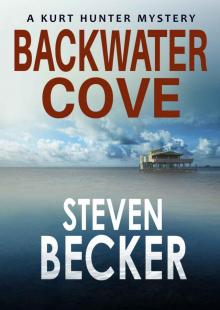 Backwater Cove
Backwater Cove Storm Surge: A Fast Paced International Adventure Thriller (Storm Thriller Series Book 3)
Storm Surge: A Fast Paced International Adventure Thriller (Storm Thriller Series Book 3)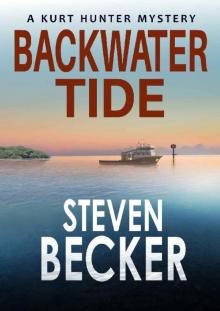 Backwater Tide
Backwater Tide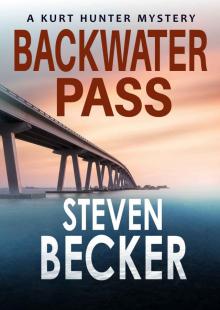 Backwater Pass
Backwater Pass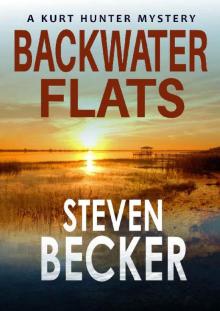 Backwater Flats
Backwater Flats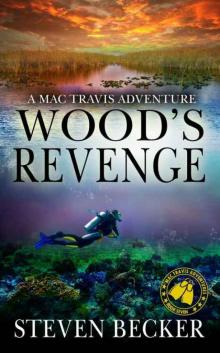 Wood's Revenge
Wood's Revenge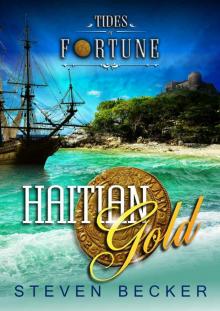 Haitian Gold
Haitian Gold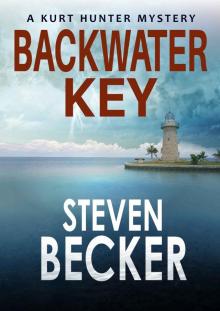 Backwater Key
Backwater Key Wood's Tempest
Wood's Tempest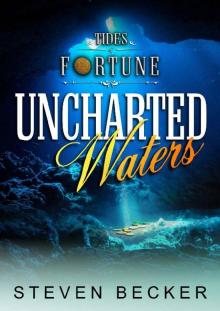 Uncharted Waters
Uncharted Waters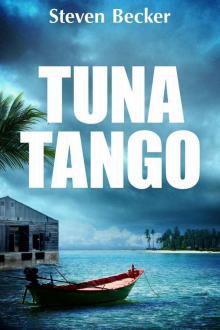 Tuna Tango
Tuna Tango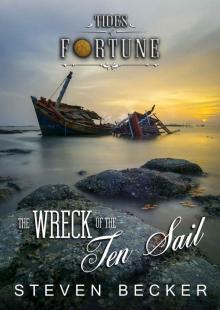 The Wreck of the Ten Sail
The Wreck of the Ten Sail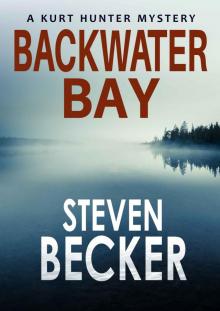 Backwater Bay (Kurt Hunter Mysteries Book 1)
Backwater Bay (Kurt Hunter Mysteries Book 1) Storm Clouds
Storm Clouds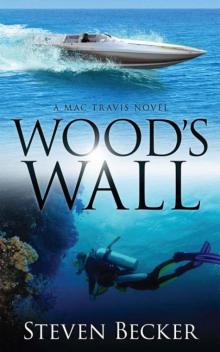 Wood's Wall
Wood's Wall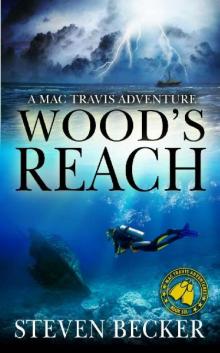 Wood's Reach
Wood's Reach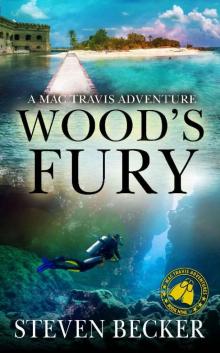 Wood's Fury
Wood's Fury Storm Rising
Storm Rising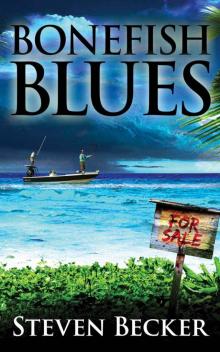 Bonefish Blues
Bonefish Blues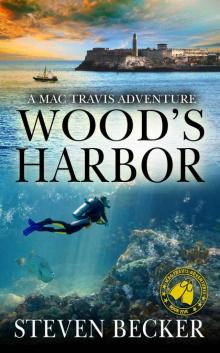 Wood's Harbor: Action & Sea Adventure in the Florida Keys (Mac Travis Adventures Book 5)
Wood's Harbor: Action & Sea Adventure in the Florida Keys (Mac Travis Adventures Book 5)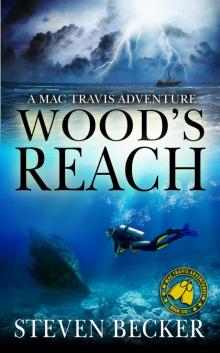 Wood's Reach: Action & Sea Adventure in the Florida Keys (Mac Travis Adventures Book 6)
Wood's Reach: Action & Sea Adventure in the Florida Keys (Mac Travis Adventures Book 6)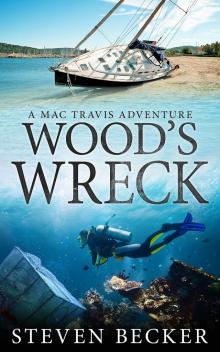 Wood's Wreck
Wood's Wreck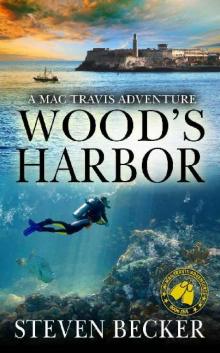 Wood's Harbor
Wood's Harbor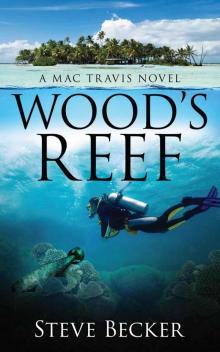 Wood's Reef
Wood's Reef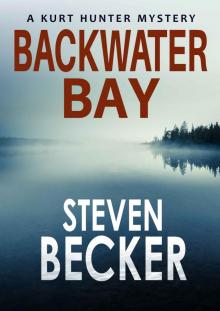 Backwater Bay
Backwater Bay